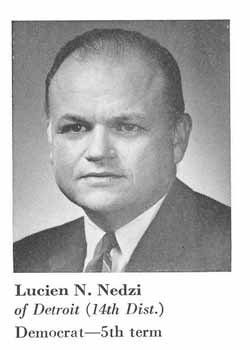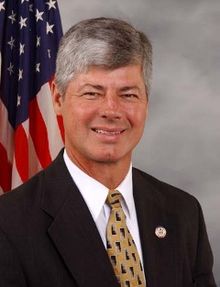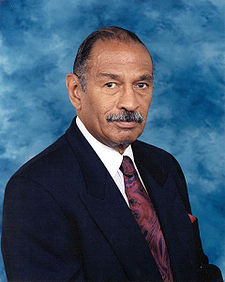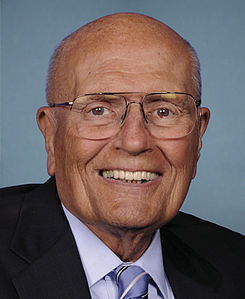What Nedzi Knows

(Rep. Lucien N. Nedzi, 1969 from Congressional Pictorial Directory.)
“Trooper Bart” Stupak was my Congressman from Michigan’s first district, a ruggedly handsome former State Patrol officer. He was a Democrat, and a relatively conservative one as reflects the philosophy of the First, who are country working people, though he went with his party on 96% of his votes.
At the end of his elected time, he came in conflict with the leadership of his party on the healthcare debacle, largely over the issue of Choice, which was a hot button Up North, and ultimately impacted his decision to leave the Congress. I saw him dozens of times when I worked on the Hill, and met him on at least one occasion. When I marched up and introduced myself as a constituent, he seemed vaguely alarmed.
I don’t know how often folks from the second-largest Congressional district east of the Mississippi get down to the nation’s capital. The First, as you know, encompasses the entire Upper Peninsula, and depending on the population level, a good chunk of the lower one, too.
That includes the Trolls who live in the Little Village By the Bay. I say “trolls” because that is what the independent-minded residents of the proud UP call all of us who live “below the bridge” at Mackinaw. For our part, the only things in the UP worth knowing are Lake Superior, the pasties, iron ore, moose and the odd bear. And snow, of course, that goes without saying.

(Trooper Bart Stupak. Photo House of Representatives.)
And Trooper Bart, of course. He was a transplant, serving with the Patrol up in Escanaba, and getting elected to the state legislature out of Menominee. Covering his sprawling district was a challenge. In a moment of lunacy, a Sevengali pal of mine had advanced the proposition of my running against Trooper Bart, and considered my utter lack of experience in politics to be a plus, sort of like President Obama’s record of voting “present” in the Illinois Senate.
A blank slate in politics is infinitely better than having actual positions on things. It preserves your flexibility.
Anyway, getting elected to the First means essentially that you live here in Washington most of the time, and knowing far more about the several unpalatable ways to get back Up North, my ardor for elected office flagged. The divorce wouldn’t have helped me anyway. The district makes up about 44% of the land area of the state of Michigan. It contains the second-longest shoreline of any district in the United States, behind the at-large district of Alaska where Annook lives when she is not cleaning out the house in the Little Village by the Bay.
Talking about the First is confusing- it used to be the 14th until the big redistricting of 1962, and parts of it the 11th. That was a giddy time in the Wolverine State. The census of 1960 represented the zenith of the population of the Motor City, and Michigan gained a congressional seat.
I remember Big Mama was heavily engaged in the process of the 1961-62 Constitutional Convention as President of the Grabbingham League of Woman Voters. They held discussion groups to focus issues. George Romney was leaving American Motors where Raven was designing Ramblers like the ’59 sedan that is sitting on flat tires in the Taj Garage Up North.
Mr. Romney had seized the opportunity of Con-Con to wrap himself in the cloak of reform and cast out the Democrats from the governorship. The future looked bright for George, and could have included the White House. We didn’t know any better at the time, you know?
They are redistricting again, as a result of the 2010 Census. The Republicans control the State house, senate and the governor’s mansion, so as they have to lose a seat in Congress, it will not be in a red district.

(The Honorable Johnny Convers. Photo House of Representatives.)
The 14th is safe for Rep John Conyers, the iconic second-senior serving member of Congress. He has been returned safely in more than twenty general elections, which places him in a position to overlap the time of the guy who used to represent the 14th, before they changed the name in 1962.
The 15th, incidentally, is represented by John Dingell, the Dean of the House of Representatives.

(Dean of the House Johnny Dingell. Photo Congressman Dingell.)
Taking his father’s time in the seat before him, the Dingells have owned west Detroit and the adjacent suburbs since 1933. As far as I can tell, Rep. Dingell grew up in the District and never spent much time in Michigan, but that is up to the voters in Detroit.
John Conyer’s 14th has been hemorrhaging population since he was first elected in the huge Democratic wave of freshmen in 1965, and they are doing the best they can to gerrymander him out of a job.
Anyway, prior to 1993, Up North Michigan was the 14th, so I understand how people can get confused. The whole redistricting thing is very emotional, since Michigan is losing a congressional seat.
A statement from the Michigan Congressional Delegation Democratic Caucus is suitably outraged:
“We are very disappointed in the partisan hijacking of the redistricting process. Never in Michigan’s history has a redistricting map been gerrymandered to be so overtly partisan and disrespectful of community interest to build a partisan political advantage. This map zigs and zags throughout Southeastern Michigan to create non-competitive seats that do not represent the demographics of the state and will ultimately disenfranchise voters.”
I don’t know about that, since if they were in power, the gerrymandering would gone the other way. Besides, getting elected ought to have something to do with what you believe, right?
Trooper Bart was a Democrat, and the First District has always had a populist leaning, which increased after they gave the populous Republican-leaning Traverse City area to the 4th District in 2002.
Now, that is a long way around not having to talk about the last Shuttle mission in progress, or the ignominy of having to hitch rides to the International Space Station that we built with the Russians for the next maybe forever.
Mac is back from the beach, I am back from the First Congressional District, and it is time to get back to Willow and talk about what happened in the Ford Administration that changed the intelligence community.
Jerry Ford represented Michigan’s Fifth District for a quarter century, the one with all the block-headed Dutch in it. His last eight years in Congress were as the Republican Minority Leader in the House when that seemed like a permanent position. He was a reliable enough apparatchik to be pulled onto the Warren Commission whitewash of the Kennedy killing, remember?
With Betty Ford passing away this weekend, that sort of brings the Ford Administration to a final end, with many of those loose ends still raveled. My son and I went down to the National Mall when Jerry passed, and his cortege made the pilgrimage of the monuments. Between the Warren Commission, the pardon of President Nixon and the conquest of the Republic of Vietnam nine months into his unelected Presidency, you would think he would be a more controversial figure than history has cast him. But I say the hell with it.
He was a good congressman for us in Grand Rapids, when the Socotras lived there, and people genuinely liked him.
During Ford’s incumbency, foreign policy was characterized in procedural terms by the increased role Congress began to play in that sand-box, and by the corresponding curb on the powers of the President. That is what ultimately brings me around to the matter of Lucien Norbert Nedzi (born the year after Raven) who was the Democratic Congressman from the 14th, later the 1st, between the special election in 1961 and the time he threw in the towel in 1980 and did not seek re-election.
Nedzi may be the last guy in a position to know what was going on then, besides Mac. Nedzi was born in Hamtramck, the Polish enclave surrounded by Detroit. He was a Wolverine, like Bonds and Muhammed and me, and went to the U-of-D law school in between stints in the Army in the Pacific War and recall for Korea.
Like I said, Nedzi was elected as a Democrat in 1961 after Thaddeus Machrowicz died in office. The key to his being remembered at all is the curious thing that happened in May of 1973. Lucien had the unique position to be a member of the House Armed Services Committee, and Chairman of the Special Subcommittee on Intelligence.
Director Colby had inherited the toxic “Family Jewels” from Jim Schlesinger which detailed the activities conducted by the CIA that might have “exceeded the charter of the Agency.” Colby was summoned to discuss the matter with Nedzi on the Hill in an extraordinary session detailed by a declassified Memo-for-the-Record drafted by CIA Inspector General William Broe.
The two hour-session included a discussion of the full report, item-by-item, including the sensitive portion that remains redacted to this day.
According to Broe, the congressman found it found sobering. Some of the topics included:
a. Alien documentation furnished to the Secret Service. He desired more information concerning the reason why issued, the use, and how controlled.
b. Financial support to the White House in connection with the replies to letters and telegrams as a result of the President’s speech on Cambodia in 1970. He requested more information on this subject.
c. Beacons furnished Ambassadors. He was interested in the number issued to Ambassadors and the position the State Department took on the use of these beacons. He was interested if the Department of State was pushing this program, as he believed they should be.
d. Logistics’ acquisition of police equipment. He questioned whether LEAA, Department of Justice, should not be doing this rather than the Agency.
e. He noted Logistics furnished telephone analyzers, and desired to know what they were and how used.
f. [redacted]
g. OER’s crash project concerning Robert L. Vesco requested by the DCI. The Congressman was interested in who outside the Agency instigated the project and why was it stopped.
h. Several ORD projects indicated research done without knowledge of the host system or on unwitting subjects. He was of the opinion that this was risky and recommended it be terminated. He stated he would like to see a directive go out to the researchers concerning these practices.
i. John Dean’s request re Investors Overseas Service. He reviewed the six reports that had been furnished. He noted, however, that the item stated “there were multiple channels to the Agency from the White House” and requested information concerning these channels.
j. Alien passports. Mr. Colby advised that he planned to review this whole subject and the Congressman agreed with the need to do so.
The Congressman asked Mr. Colby if the Agency had considered how much of the information just reviewed with him could be made public. Mr. Colby stated this had not been done yet, and spoke to the question of sources, methods, and the impact on the institution. The Congressman stated that in the current climate he felt it was necessary to open up more information to help clear the air.
Mr. Colby stated the Agency would give the matter deep consideration, and added he had been thinking of a general statement along these lines to be used at his confirmation hearing.
The cat was about to come out of the bag- or at least part of the cat out of one of the bags. Tip O’Neil acquiesced when Congressman Nedzi demanded to be placed in charge of a Select Committee to formally “clear the air,” a position he assumed in February, 1975, and which he abruptly resigned in June.
I wondered about that, since Otis Pike replaced him as chair for a tumultuous and shocking set of disclosures about what had been going on for years. I will be interested to see what Mac has to say about that. I wonder if Nedzi found out something about the IC that he did not want to have on his permanent record. After all, he was in a position to suddenly be investigating the work he should have been doing as the senior oversight official on the IC.
I know this: in the Congressman’s remaining three terms in Congress, he never got closer to the intelligence community than the Joint Committee on the Library. I am not going to speculate any further, though.
There is a way to find out, though. Like Trooper Bart, and John Dingell and John Conyers, he didn’t return to Michigan. He lives right here in McLean, and his number is in the phone book.
If he is not in the same boat as Raven, he might answer a few questions if I called him up. You never can tell.
Copyright 2011 Vic Socotra
www.vicsocotra.com
